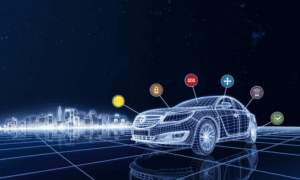For over a century, car ownership has been a cornerstone of the global economy and a symbol of personal freedom and status. The act of buying, owning, and maintaining a vehicle has been a fundamental part of life for millions of people. However, as we look to 2025 and beyond, this traditional model is undergoing a profound and irreversible transformation. A confluence of technological breakthroughs, evolving consumer values, and urban challenges is reshaping our relationship with the automobile. The future of car ownership is not about a single solution but about a dynamic ecosystem of choices that offers greater flexibility, efficiency, and sustainability. This comprehensive article will take a deep dive into the core trends that are defining this new era, exploring how ride-sharing, subscriptions, and autonomous technology are creating a future where a car is no longer just a possession but a personalized service tailored to our every need.
The Decline of Personal Ownership

The traditional model of car ownership is being challenged by a number of powerful forces, and the concept of a car as a lifelong possession is losing its appeal for a new generation of consumers, especially in urban areas.
A. The Rise of Mobility-as-a-Service (MaaS): MaaS is a concept that moves beyond car ownership to a service-based model where people can access a variety of transportation options—from ride-sharing and public transit to e-scooters and bike-sharing—from a single app. This provides a more convenient and cost-effective way to get around, and it encourages people to use the most sustainable and efficient option for their journey. For many people, a MaaS subscription is a more attractive option than the financial burden and hassle of car ownership.
B. The Financial Burden of Ownership: A car is a depreciating asset with a number of significant costs, including the initial purchase price, insurance, maintenance, and fuel. For urban dwellers, these costs are compounded by the high cost of parking. These financial burdens are a major factor driving the shift away from car ownership, especially for younger people who are prioritizing experiences over possessions.
C. Urbanization and Congestion: As cities become more densely populated, traffic congestion and parking challenges are becoming a major source of stress. For many urbanites, a car is no longer a symbol of freedom but a source of frustration. The convenience of on-demand transportation and the efficiency of public transit are becoming a more attractive alternative.
D. The Environmental Cost: There is a growing awareness of the environmental impact of a gasoline-powered car. A new generation of consumers is making their purchasing decisions based on environmental and social impact, and for many, the carbon footprint of car ownership is a major deterrent. The shift to a service-based model, with a focus on shared and electric vehicles, is a key part of building a more sustainable future.
The New Models of Access and Ownership
As the traditional model of ownership declines, a number of innovative new models are emerging to provide people with access to a car without the burden of ownership.
A. Car-Sharing and Peer-to-Peer Rentals: Car-sharing services like Zipcar and peer-to-peer rental platforms like Turo are providing people with on-demand access to a car without the financial burden of ownership. This is an ideal solution for people who only need a car for a few hours or for a weekend trip. It allows them to choose the right car for the right occasion, whether it’s a truck for moving or a luxury car for a special event.
B. Vehicle Subscriptions: The vehicle subscription model is gaining traction, especially for consumers who want the convenience of a car without the long-term commitment of a purchase or a lease. With a subscription, a consumer pays a single monthly fee that covers the car, insurance, maintenance, and roadside assistance. They can also switch to a different vehicle at any time, which is an ideal solution for people who want to try out a variety of different cars.
C. The Electric Vehicle (EV) Advantage: The rise of EVs is intrinsically linked to these new models of ownership. EVs are a perfect fit for ride-sharing and car-sharing fleets due to their lower maintenance costs, zero tailpipe emissions, and a more comfortable and silent ride. The convenience of a charging station at a central hub also makes them an ideal choice for a fleet manager.
The Transformative Power of Autonomous Vehicles
The rise of autonomous vehicles is poised to be the single biggest factor in accelerating the decline of personal car ownership. When a car can drive itself, its value as a possession is fundamentally changed.
A. The Autonomous Ride-Sharing Fleet: The future of ride-sharing is an autonomous fleet of vehicles that can pick you up and drop you off without a driver. This will dramatically lower the cost of ride-sharing and will make it a more convenient and accessible option than personal car ownership for a majority of people. A fleet of autonomous vehicles can be optimized for efficiency, with the cars constantly on the move, picking up new passengers and transporting them to their destination.
B. The Car as a Service, Not a Possession: When a car can drive itself, it becomes a service, much like an elevator or an appliance. You don’t own the elevator in your building; you use it as a service. The future of car ownership is the same. The car will be a service that you call on when you need it, and that will be a more convenient, cost-effective, and sustainable solution than owning your own.
C. A New Level of Freedom: The rise of autonomous ride-sharing will provide a new level of freedom for people who cannot drive, such as the elderly, people with disabilities, and children. It will also free up a person’s time, allowing them to work, read, or relax during their commute. This can have a massive impact on productivity and quality of life.
Addressing the Challenges and the Road Ahead

Despite the immense promise of this new era, there are still a number of significant challenges that must be addressed for these new models of ownership to be widely adopted.
A. The Cultural Shift: For many people, a car is more than just a mode of transportation; it is a symbol of personal freedom, a source of pride, and a part of their identity. The shift away from ownership will require a major cultural shift in our relationship with the automobile. This will be a long process, but it is already well underway, especially for a new generation of consumers who are less attached to the idea of car ownership.
B. The Regulatory and Legal Frameworks: The current legal framework for transportation is based on the idea of a human driver. New laws and regulations are needed to address issues like liability in case of an accident, data privacy, and the standards that a ride-sharing fleet must meet to be on the road.
C. The Rural-Urban Divide: While the new models of ownership are a perfect fit for urban environments, they are less viable in rural areas where the population density is lower and the need for a personal vehicle is still very high. The future of car ownership will be a patchwork of different models, with personal ownership still a strong factor in rural communities.
D. The Future of the Automotive Industry: The shift away from personal ownership will have a massive impact on the automotive industry. Car manufacturers will need to adapt their business models from selling cars to providing a service. This will require a major investment in new technologies, new business models, and a new way of thinking about the car.
Conclusion
The future of car ownership is not about the death of the automobile but about its rebirth as a more efficient, sustainable, and convenient service. The year 2025 is a testament to the fact that this future is no longer a distant vision but a tangible reality, powered by a powerful convergence of technology, urban challenges, and a new generation of consumer values. The rise of ride-sharing, vehicle subscriptions, and autonomous technology is providing a powerful and compelling alternative to the traditional model of ownership, and for many people, it is a smarter and more liberating choice.
The long-term impact of this transformation will be immense. It will lead to a dramatic reduction in traffic congestion and urban air pollution, a more efficient use of resources, and a new level of freedom for millions of people. The car of the future will be a personalized, on-demand service that provides a seamless and enjoyable experience, and it will be a key part of building a world that is more sustainable, more connected, and more in harmony with the way we live and move. By embracing this new era of mobility, we are not just changing the way we get around; we are changing our relationship with the world, building a future that is in perfect harmony with both.











